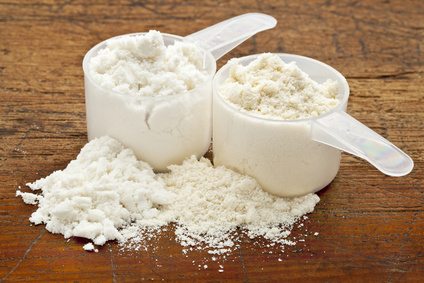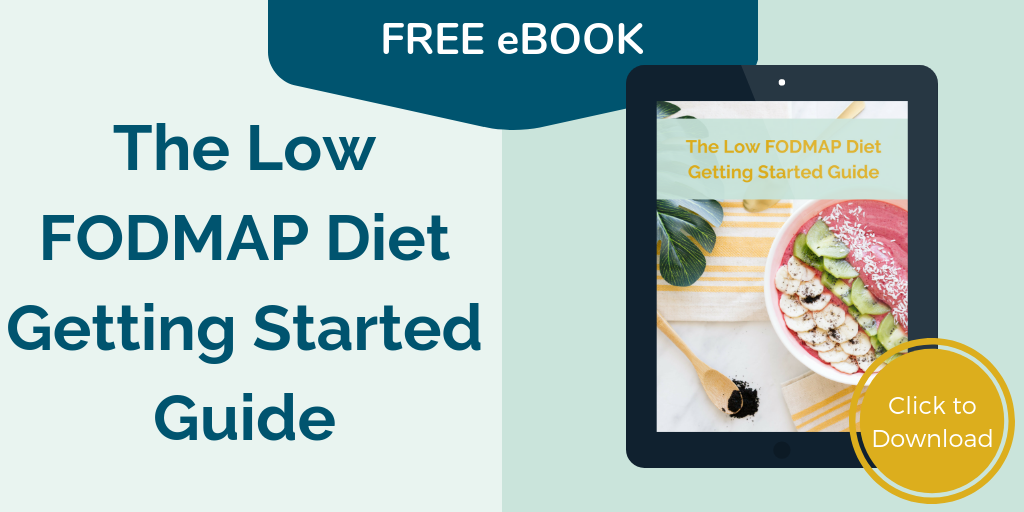IBS Protein Powders
Is Protein Powder OK for Digestive Issues?
Relief Report 013: Can I have Protein Powder if I have IBS or Digestive Issues?
Posted by Stephanie Clairmont, RD on Wednesday, October 18, 2017
Protein powders can be such a convenient way to add a boost of protein to your smoothies and snacks! The fact that it’s shelf stable also makes it great for those of us on-the-go. I’m all about eating real, whole foods as much as possible, but I also realize that life gets busy and sometimes convenience is important too 😉 I often add protein powder to my afternoon smoothies to help keep me full and satisfied between lunch and dinner. I also add it to my protein peanut butter balls which I love having on hand as a quick treat when I need a little something. Mmmm so yummy!
IBS Protein Sources
There are many sources of protein that can be good for digestion if you have IBS. Since the science behind the low FODMAP diet is all about avoiding foods with certain types of carbohydrates that are hard to digest, foods that are considered protein sources are generally low FODMAP. This means all animal proteins (meat and eggs) are low FODMAP since they are just made of protein and fat, no carbohydrate.
Plant proteins are a little more difficult on a low FODMAP diet, since these protein sources also contain carbohydrates, so you have to take a look at things like whole grains and beans on a case-by-case basis since portion size will also play a role in determining FODMAP content.
When it comes to dairy sources of protein like milk and yogurt, just remember to opt for lactose-free options and you should be just fine. Most cheeses, on the other hand, are naturally very low in lactose, and can be well tolerated by those with IBS as long as portion sizes are kept in moderation.
No matter what whole food sources you choose to get your protein from (hint: a variety of different sources is best to maximize nutrition), getting enough will help keep you full and satisfied between meals. This is really important to help you avoid snacking in between meals and give your digestive system a chance to clear out before it has to start work again digesting your next meal. Leaving 3-4 hours between eating is your best bet, and making sure you get adequate protein in at each meal is really going to help with this.
Focus on getting a variety of low FODMAP plant and animals sources of protein in throughout your day. Lactose-free Greek yogurt at breakfast, tofu at lunch, and chicken at dinner is just one example, but you can mix and match your low FODMAP favourites!
The first step if you’re looking to improve irritable bowel syndrome (IBS) or another digestive disorder or disease, is to understand more about the Low FODMAP diet and if it can help. Download my free eBook to help you better understand this diet and get started implementing simple steps to get rid of symptoms like gas, bloating, pain, diarrhea or constipation related to IBS. Click here to get a copy emailed to you right away.
Low FODMAP Protein Powder
Sometimes it’s hard to meet your protein needs from whole food sources, especially if you are following a vegetarian or vegan diet on top of low FODMAP! Even of you’re not vegetarian or vegan, protein powders offer a level of convenience that just can’t compete with whole foods that require much more preparation time and proper storage conditions to keep them from spoiling – not always possible when you’re on-the-go! For those times that you might need the added convenience of a protein powder, it’s always good to know what your options are when it comes to protein powders for IBS.
Stellar Labs is now offering a FODMAP Friendly certified vegan protein powder that comes in two flavours, vanilla and chocolate! The protein powder is advertised as being low in artificial colouring, preservatives, and sweeteners, and a great option for mixing on the go – no blender required! Ingredients include pea protein, hemp protein, and chia seed.
Wait a minute…aren’t peas high in FODMAPs? How can a product containing pea protein possibly be low FODMAP? Because the protein from the peas was isolated and removed from the carbohydrate part of the pea, the FODMAPs were also removed! Remember, FODMAPs are sugars! This is a great example of how food processing can significantly impact what you can and can not eat on a low FODMAP diet.
You may be wondering about some of the other ingredients like guar gum, kelp powder, and sacha inchi protein. After all, if you look for these on the Monash Low FODMAP app or even the FODMAP Friendly app, you’ll see they are nowhere to be found! When buying anything from the store with an ingredients list, it can be easy to get caught up in analyzing every ingredients to make sure it’s got the green light.
Here’s my best advice:
Limit your processed food consumption – if it’s got an ingredient list, it was processed in some way. Focus on those foods that don’t come in packages more often. Real, whole, fresh foods don’t have ingredients, they ARE ingredients 😉
Every body is different! While a textbook low FODMAP diet may work wonders for some people with IBS, the diet needs to be tweaked and personalized for others to experience the same relief. We don’t all respond to the same FODMAPs in the same way. So, as much as these apps and food lists can be a helpful guide, don’t let them rule your life or cause you unnecessary stress when it comes to your food choices. You are more than a “low FODMAPer”. You are more than your IBS! Listen to your body and work with it, not against it. A Registered Dietitian who is an expert in digestive health can help you with an individualized approach that works for you.
Do I Need a Low FODMAP Protein Powder?
Probably not. As nice as it is that we have options like Stellar Labs FODMAP Friendly vegan protein powders, the truth is that you will probably do just as well on a simple protein powder made from a low FODMAP source such as rice, quinoa, or hemp that can be easily digested! The main thing to look for is short and simple ingredient lists. The best thing to do is test out a few different options that are easily available to you and see how your body responds. Remember to track those symptoms! We are all different, so you’ll never know until you try.
Wishing you much love & wellness,
Stephanie


